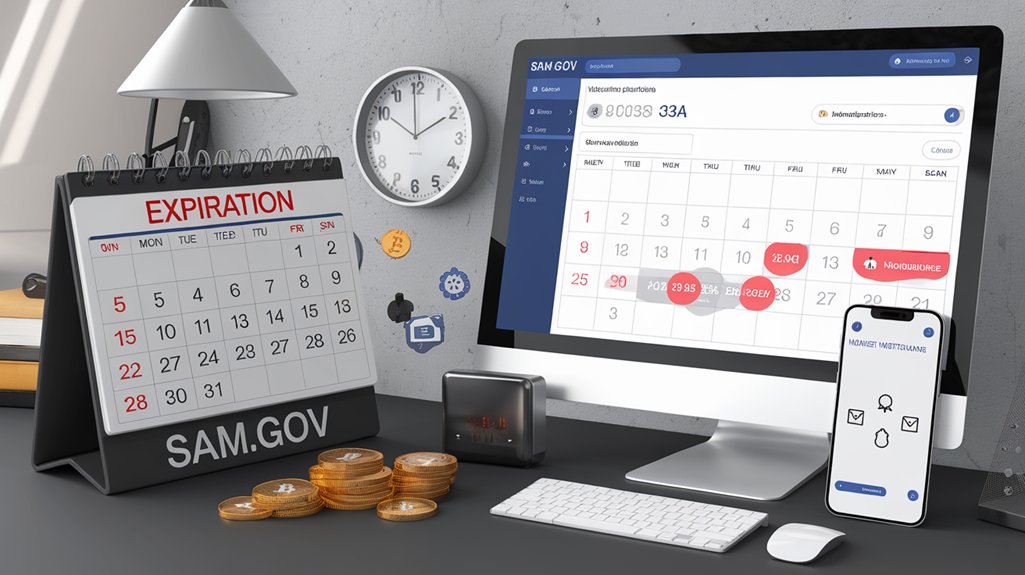To check your SAM registration expiration date, log into SAM.gov and access your Entity Status Tracker using your UEI or CAGE code. The system displays your current status and expiration date on the profile dashboard. Alternatively, download your registration record as a PDF for documentation. Set up email notifications in your account settings to receive automated reminders 60, 30, and 15 days before expiration. The following sections outline additional monitoring methods for consistent compliance management.
SAM Expiration Date Search Methods

Checking a SAM registration expiration date requires access to specific tools and methods on the SAM.gov platform. Organizations can utilize several expiration search methods to verify their status.
The primary approach involves using the Entity Status Tracker, where users can enter their Unique Entity ID (UEI) or CAGE code to check if the registration is “Active,” “Expired,” or “Inactive.” For detailed expiration information, account-based access is necessary, as public searches don’t display exact expiration dates. Maintaining compliance requirements is essential for organizations seeking to engage in federal contracts and grants.
Verify registration status quickly with the Entity Status Tracker using your UEI or CAGE code, but remember that full expiration details require account login.
Registered users should log into SAM.gov and navigate to “Manage Entity” in their workspace, where the “Registration Status” section displays the expiration date. Active registrations remain valid for 365 days from the submission date before requiring renewal. It is highly recommended to begin the renewal process 30 days before expiration to ensure continuous eligibility for federal opportunities.
Organizations tracking registration status for compliance purposes can also download PDF registration records or utilize the Advanced Entity Search feature to filter by status.
For multiple entities, enterprise users may implement batch check tools through APIs to monitor expiration dates systematically.
Understanding Expiration Notifications and Timing

The timing protocols for these notifications follow a structured schedule. Organizations receive alerts during the month preceding expiration, with most systems offering a 30-day advance warning window.
The eGrants platform provides a bulk update feature accessible during this pre-expiration period, allowing organizations to update multiple grants simultaneously.
Failure to respond to these notifications within prescribed timeframes—often as short as five days for third-party notices—can result in immediate payment suspensions and contract bidding disqualification.
Missing your SAM registration deadline can temporarily prevent you from bidding on contracts or receiving payments for existing federal work.
To avoid disruptions, entities should implement proactive measures such as calendar reminders synchronized with annual renewal cycles and customize SAM.gov alerts to monitor entity-specific expiration windows.
Smart Renewal Strategies: Avoiding Lapsed Registration

While maintaining an active SAM registration requires diligence, organizations can implement several strategic approaches to prevent costly lapses. Establishing a clear renewal timeline is essential, with reminders set at 90, 60, and 30 days before expiration to guarantee adequate preparation time.
Document management forms the foundation of compliance accuracy. Organizations should regularly verify that all business information, including Unique Entity IDs and banking details, remains current and consistent across all platforms. An expired SAM registration can result in payment delays for existing federal contracts, creating financial hardships for businesses. Email notifications from SAM.gov serve as important reminders of upcoming renewal deadlines and should never be ignored.
Any ownership changes must be promptly documented to maintain eligibility. Neglecting SAM renewal can result in lost opportunities for government contracts and grants that could be vital to your organization’s growth.
Efficient process management can be achieved through:
- Early initiation of the renewal process
- Thorough verification of all submission data
- Designation of a team member responsible for oversight
- Implementation of project management tools to track progress
Setting internal deadlines well before the actual expiration date provides buffer time for addressing unexpected issues, guaranteeing continuous registration without interruption.
Frequently Asked Questions
What Happens if My SAM Registration Expires During a Contract?
When a SAM registration expires during an active contract, severe consequences may follow. The government can terminate the contract, suspend payments, and halt ongoing activities.
The contractor becomes ineligible for new awards and may face legal disputes over contract validity. The renewal process requires proactive management, with submissions recommended at least 60 days before expiration to guarantee validation.
Organizations must monitor expiration dates closely to maintain continuous eligibility and avoid business disruptions.
Can I Transfer My SAM Registration to Another Business Entity?
Yes, a SAM registration can be transferred to another business entity.
The process requires contacting the SAM help desk or using the support section on the SAM website. Both entities must provide legal documentation including entity names, TINs, D-U-N-S numbers, and business addresses.
The registration transfer undergoes verification with the IRS and other compliance checks. Once approved, the new entity must update all relevant information and manage the SAM account going forward.
How Do Different Agency Systems Handle Expired SAM Registrations?
Federal agency systems respond to expired SAM registrations by automatically blocking new awards and halting payments on existing contracts.
Agency notification processes typically include system flags that alert contracting officers to registration issues.
Expired registration consequences vary across agencies, with some systems automatically suspending vendor accounts while others require manual intervention.
Most agencies cannot process contract modifications or exercise options until the registration is renewed, creating workflow disruptions throughout the procurement cycle.
Are SAM Registration Requirements Different for International Entities?
Yes, SAM registration requirements differ for international entities while maintaining similar entity eligibility standards.
International businesses must obtain specific prerequisites, including a DUNS number and NCAGE code, before beginning registration.
Unlike domestic registrants, foreign entities face different address validation protocols and don’t need U.S. addresses.
However, international compliance standards remain consistent, requiring the same annual renewal process and identical banking information requirements.
Foreign registrants must guarantee legal name consistency across all documentation systems.
Can Subcontractors Use a Prime Contractor’s SAM Registration?
No, subcontractors cannot use a prime contractor‘s SAM registration.
Under current policies, subcontractors are not required to register in SAM at all, as of March 29, 2023.
Prime contractor responsibilities include verifying subcontractor eligibility through the Excluded Parties List System for subcontracts exceeding $25,000.
While subcontractors don’t need their own SAM registration to participate in federal contracts, they may need to provide certification confirming they aren’t excluded from covered transactions.